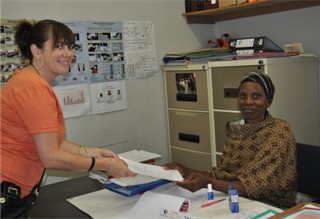
Though many rape survivors in sub-Saharan Africa are children, clinical services in most facilities are not child friendly. In Swaziland, rape often goes unreported, undocumented, or is dismissed by the authorities. As anecdotal evidence shows, when survivors seek post-rape care and treatment, they are often asked to repeat their stories multiple times, causing additional emotional trauma. And police, who rely on doctors’ reports for evidence of rape, are at risk of misinterpreting clinical findings. For example, if doctors find no abrasions, they may write: “No evidence of penetration.” Police may take that to mean that no rape occurred.
With support from USAID, the International Association of Forensic Nurses sent two American nurses to Swaziland in September 2012 to advise local health facilities on how to better care for young rape survivors.
Forensic nurses often care for victims of violence. The nurses, Megan Lechner and Kim Nash, traveled to health facilities in all four regions where they assessed current systems of post-rape care for child survivors and advised health care staff on how to improve them. The need for such improvements is magnified by Swaziland’s high HIV & AIDS prevalence and the elevated risk of HIV transmission in forced, unprotected sex.
Lechner and Nash also spent time at Raleigh Fitkin Memorial Hospital, a teaching hospital in Manzi, Swaziland, where they mentored doctors, nurses and social workers to achieve a more integrated and less distressing intake and examination process for young rape victims.
The nurses followed the patients through the entire process and helped to coordinate information-sharing among the providers. They encouraged staff to help survivors overcome their fear and shame by speaking compassionately to patients with statements like “I believe you” and “I am proud of you.”
Lechner remembers gaining the trust of one 16-year-old girl who sought care after her boyfriend raped her by asking her, “What do you like to do in your spare time?” The girl said she liked to read. That simple question established a bond between them.
During their mission, the nurses’ presence as mentors created improvements on the spot. When they concluded their work, they left providers with checklists that included points on what to look for, what to say to survivors and their families, and how to document results so they can be understood and acted on.
This mentorship project in Swaziland is just one example of USAID’s efforts against gender-based violence. USAID’s multisectoral approach involves health, education, and research initiatives to change behavior about gender violence, increase learning and economic opportunities for women and girls, and promote policies and laws to improve gender equality and access to health services.
In all, the nurses only spent about eight weeks in Swaziland. “I often felt that our contribution was just a small drop in a huge bucket of need,” Nash said. But that “small drop” made a difference for both providers and patients at the hospital.







Comment
Make a general inquiry or suggest an improvement.